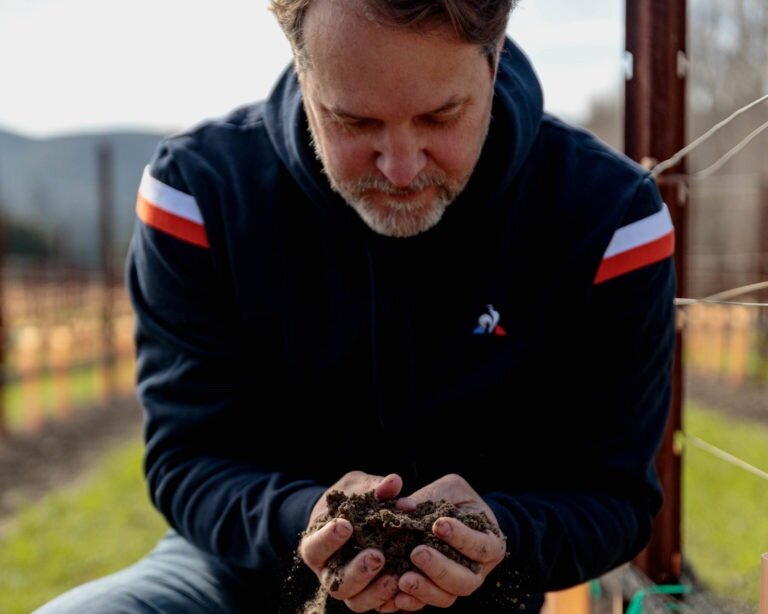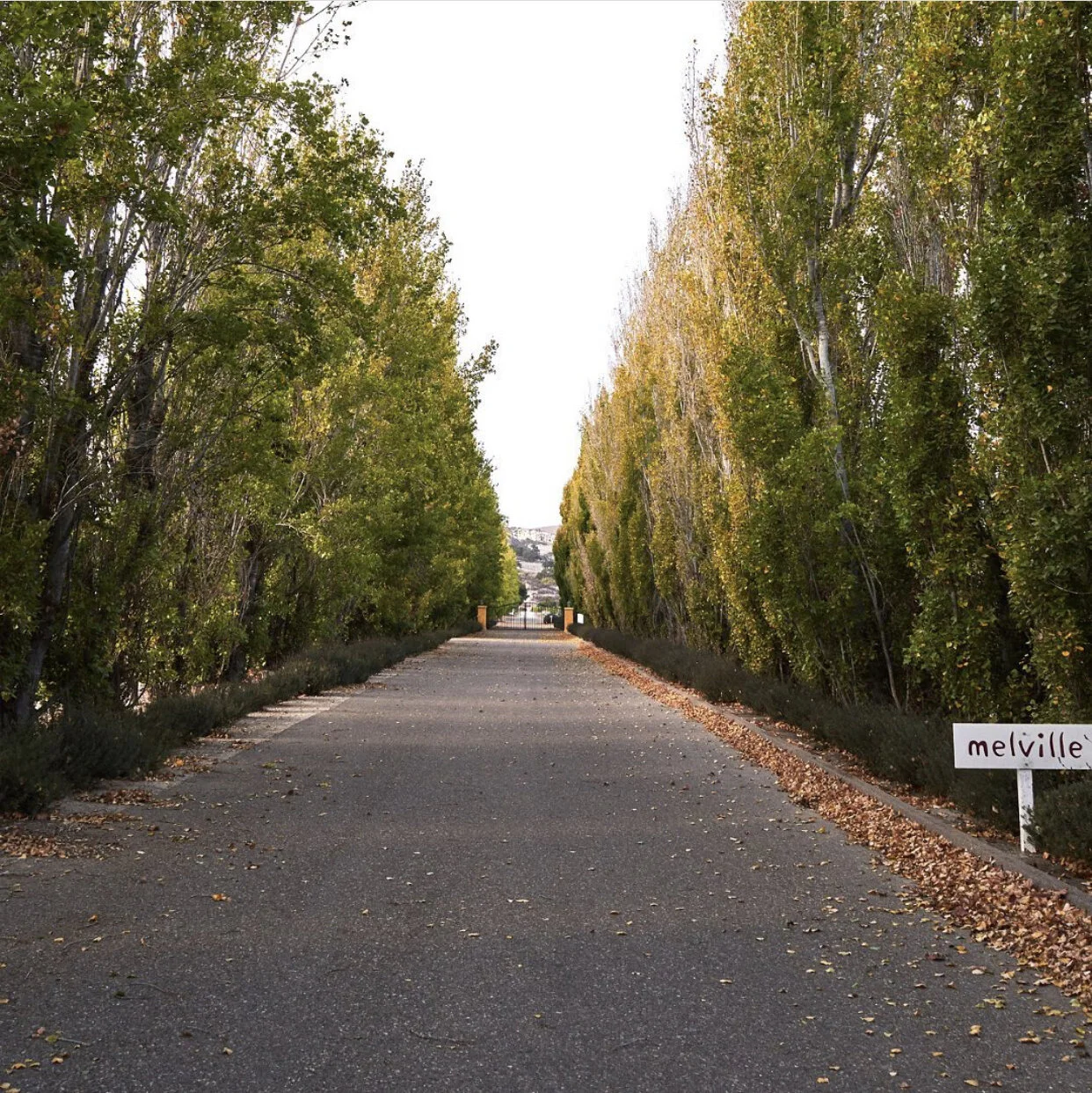melville
Chad Melville
Sta. Rita Hills
Santa barbara county - california
story…
The Melville family winery was originally founded in the Knights Valley of Sonoma County in 1989 by Ron Melville. Here he farmed traditional varieties commonly found in the area like Chardonnay, Merlot, & Cabernet Sauvignon which they then sold off to prominent wineries in and around the area. Over time, and a growing push from his son Chad, there was a desire to farm, grow, & produce cool climate varieties California. This desire led to look outside of the North Coast for land, which eventually led them to purchase property in Lompoc, in the Sta. Rita Hills in 1996. Ron, along with his son Chad and their families relocated south and began the foundation of what we all know today as the Melville Winery. Planting Chardonnay, Pinot Noir, & Syrah across their sizable estate property. It is worth noting that at this time this was not a stand alone AVA like it is today & to move from the successful wine area in Knights Valley to a very little known region in the greater Santa Barbara area was a fairly bold choice to make.
Ron is a gardener & farmer at heart, a passion he inherited from his father and subsequently has passed onto his sons, Chad & Brent. The Melville winery has a been one of the driving estates in the Sta. Rita Hills appellation since well before it was established as an official AVA, which the Melville’s played a huge role in getting established. For the first 20 years the wines at Melville were made by Greg Brewer, another highly talented winemaker & champion of the Sta. Rita Hills growing region. Greg really set the tone for the style and philosophy at Melville with his use of whole cluster ferments for reds and for no new oak on any of the wines.
In 2016 Chad Melville came on full time at the family estate he co-founded with his father to be the head winemaker. Prior to this move Chad spent a fair amount of time in the financial world & was quite successful there before giving into his passion for wine. He first created his own small brand, SAMsARA with his wife Mary where they focused on small lot Pinot Noir & Syrah. Mary eventually left her promising job in advertising to be full time with Chad in the wineworld. When Chad rejoined his father at Melville, he & Mary also sold their SAMsARA label so they could both focus entirely on the family estate. Chad had always been involved at some capacity at Melville, having co-founded the current iteration with his father in Sta. Rita Hills, but this was the first time he was to be regularly involved on a day to day basis. Since coming on board the wines at Melville haven’t seen any type of change under Chad’s guidance. Melville wines have always been about showcasing the beautiful place where the grapes are grown and far less about the techniques in the cellar, a vision that Chad believes in & continues to follow. There is certainly a style to them when it comes to the production, with a preference for the use of whole clusters in the red ferments & the choice to use only neutral French oak on all the wines. At the end of the day the Melville wines are wines are about a place not a process.
philosophy…
The Melville’s farming practices all start from a core of organics. From there they build upon organic practices to custom fit the farming to their specific vineyard/parcel/varieties needs. Cover crops are implemented in all of their vineyards to help increase biodiversity throughout the estate. The fruit is all hand harvested and much of the sorting is done in the vineyards. Harvest at Melville is rather long compared to most, lasting up to 8 weeks. All of the picking is done lot by lot, meaning that each lot is picked based on its own maturity level to optimize the ripeness of the fruit in each lot. This means that fruit for some of the cuvée’s final blend are brought in weeks before others. Often times the fruit that comes in at the beginning of the harvest is fully destemmed due to the stems not being as ripe as they would like. As the harvest continues the percentage use of stems increases to the point that by the last week(s) of harvest they are including 100% of the stems.
With such dedication in the vineyards throughout the season & particularly at harvest time means that the cellar work is far less complicated. The whites are gently whole cluster pressed and left to settle overnight prior to being gravity fed to either stainless steel or neutral barrel, dependent on the cuvée. None of their whites go through malolactic fermentation. All of the whites are aged on their lees with little to no disturbance. For the reds the use of whole cluster inclusion happens across the board for all of them, percentages of inclusion vary from year to year & from wine to wine. Most of the red ferments take place in large 1.5 ton open top fermenters, the wines are then pressed to neutral oak for aging on the lees, typically unsulfured. The reds are only racked once in order to prep for bottling. Only native yeasts are used in all of their fermentations & low to moderate amounts of SO2 are used during the entire process.
Vineyards…
The Melville vineyards make up 120 acres of planted land on their property. All of their wines are produced from their estate owned and farmed vineyards. They produce both appellation level bottlings of Chardonnay, Pinot Noir & Syrah, as well as a few select single site/lot bottlings of each of these varietals.
Inox
a 1.8 acre plot of Chardonnay located at the southwestern end of their westside vineyard | the vineyard has an extremely high percentage of sandy soils as well as being a very windy & colder site | the plot is planted entirely to Clone 76 Chardonnay
Anna’s Block
an 8 acre parcel of Pinot Noir located in the northwestern end of the westside vineyard | the vineyard was planted in 2001 & is named after a longtime family friend’s grandmother
Sandy’s Block
situated at the northwest end of the eastside vineyard planted entirely to Pinot Noir | the vineyard includes several clones including: Calera, 37, 459, & 114 | it is planted in an sand heavy portion of the vineyard | named after Ron’s sister
Block M
situated at the southeastern end of the westside vineyard at the top of a sun exposed & windswept mesa | vineyard is planted entirely to Pinot Noir over sandy loam with several feet of botella clay soil
Terraces
4.9 acres of vines planted on the hillsides leading up the Block M site | vineyards are planted entirely to Pinot Noir in clay-rich loam soils with calcareous shale all facing mostly west
Donna’s
situated just south of Sandy’s block in their eastside vineyard | vineyard is planted atop a section with twenty feet of sand over clay-loam | vineyard is named for Ron’s wife

